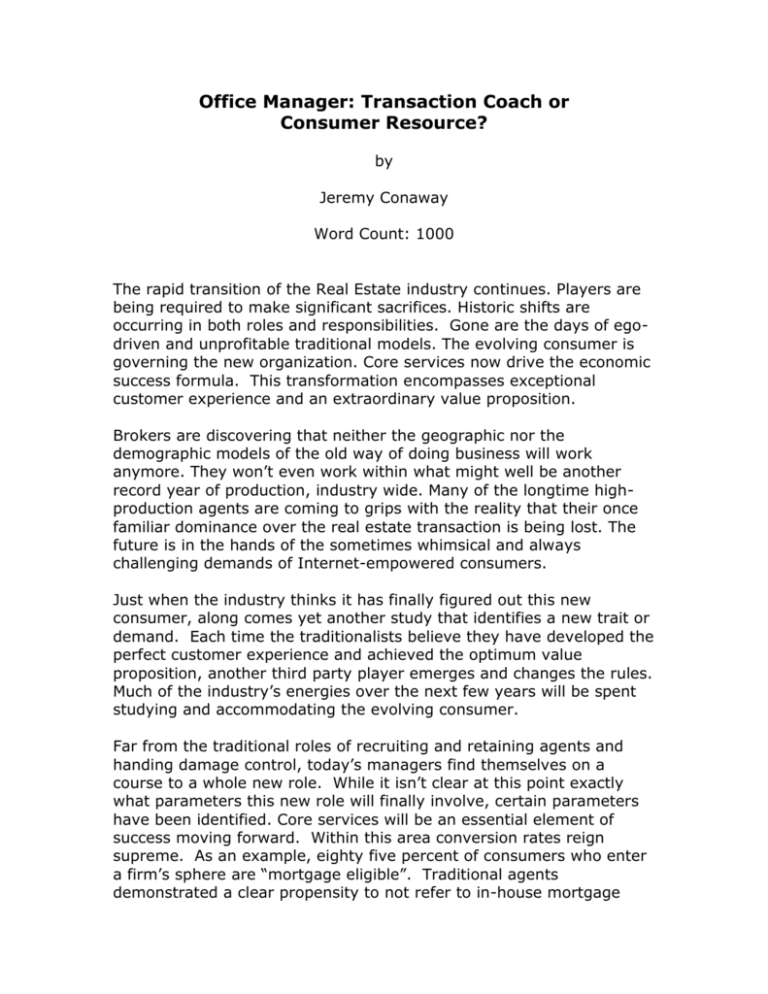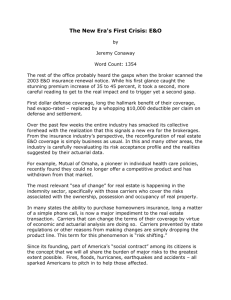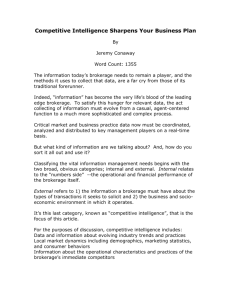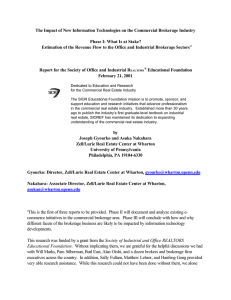
Office Manager: Transaction Coach or
Consumer Resource?
by
Jeremy Conaway
Word Count: 1000
The rapid transition of the Real Estate industry continues. Players are
being required to make significant sacrifices. Historic shifts are
occurring in both roles and responsibilities. Gone are the days of egodriven and unprofitable traditional models. The evolving consumer is
governing the new organization. Core services now drive the economic
success formula. This transformation encompasses exceptional
customer experience and an extraordinary value proposition.
Brokers are discovering that neither the geographic nor the
demographic models of the old way of doing business will work
anymore. They won’t even work within what might well be another
record year of production, industry wide. Many of the longtime highproduction agents are coming to grips with the reality that their once
familiar dominance over the real estate transaction is being lost. The
future is in the hands of the sometimes whimsical and always
challenging demands of Internet-empowered consumers.
Just when the industry thinks it has finally figured out this new
consumer, along comes yet another study that identifies a new trait or
demand. Each time the traditionalists believe they have developed the
perfect customer experience and achieved the optimum value
proposition, another third party player emerges and changes the rules.
Much of the industry’s energies over the next few years will be spent
studying and accommodating the evolving consumer.
Far from the traditional roles of recruiting and retaining agents and
handing damage control, today’s managers find themselves on a
course to a whole new role. While it isn’t clear at this point exactly
what parameters this new role will finally involve, certain parameters
have been identified. Core services will be an essential element of
success moving forward. Within this area conversion rates reign
supreme. As an example, eighty five percent of consumers who enter
a firm’s sphere are “mortgage eligible”. Traditional agents
demonstrated a clear propensity to not refer to in-house mortgage
options. The challenge of modifying this aspect of agent behavior is
falling to the manager.
Virtual leads, in 2005, will exceed twenty percent of business
nationwide. There is every indication that this volume will continue to
grow over the next several years. In many firms the care and feeding
of Internet leads has been added to the manager’s workload.
Response times will separate successful companies from all others.
Nearly one hundred percent of Internet consumers demand an agent
response within four hours. Existing industry-wide agent response time
is over twenty-four hours. So the industry is facing yet another
significant behavioral change. Once again responsibility for this
change appears to have been delegated to the managers.
The good news, with respect to the three new roles outlined above, is
that they are all somewhat natural additions to existing management
responsibilities. The bad news is that this metamorphosis is being
delayed by yet another discussion that is currently taking place in
firms around the country.
In days gone by, the industry subscribed to the concept of the
“universal agent”. This concept purports that the real estate agent
should have both the responsibility and the ability to deal with every
customer need. Only in the most dire of circumstances did the
manager, or for that matter the broker, become involved in the
customer relationship. In all other circumstances the agent was
upheld as the protean consumer solution.The consumer value
proposition is the sum total of programs, products and services being
offered for the going rate. Consumers have rejected the value
proposition represented by the universal agent. They now equate
value with the quality of the brokerage “team”.
The ramifications of this trend will be especially troublesome to the few
remaining agent-centric real estate systems and the 100% sector.
Nevertheless it will have far reaching consequences for all brokerages.
Moreover, it raises the central question of this discussion. What role
should the manager play in the customer value proposition?
Today’s consumers are increasingly demanding and receiving the
security, stability and value that come from dealing with a brokerage’s
team of experts. The agent will remain the central service
coordinator. But customers may now receive additional services from
the team of experts including lead incubation, lead management, CRM,
valuation, finance, closing, insurance, relocation, decorating, and
concierge experts. Developing that team, and the firm’s value
propositions, require the active participation of managers.
The role of the manager in this new environment is still evolving. The
totality of that role is not yet known. It will, at least, include
welcoming the customer to the company and offering to be of service
at any time during the process. Additional periodic “touches” during
the transaction will be used to measure satisfaction. The manager’s
role will also include responsibilities in the core service program. This
role may be limited to a contact call to ensure that the consumer has
been presented with all of the options. Or it may be expanded to
participation in the actual marketing function.
This discussion should be taking place in every company. It must
include an overall review of new functions and existing functions. And
it must address the role that compensation will play in the final
combination of duties. Firms must also recognize that during
transition times most managers, by default, remain responsible for the
entire range of traditional duties. Merely adding new tasks to an
already crowded list will not produce the desired results. Only a
complete evaluation, consistent with the firm’s business plan and
future objectives, will place the manager on a course to reach the
future as part of the winning solution.
Jeremy Conaway is the President of RECON Intelligence Services. He is
a recognized expert in the fields of brokerage and association design.
His company is currently a leading source of strategic and tactical
ideas and applications for the leading edge of the real estate industry.
He is a nationally known lecturer, author and facilitator. Copyright©
2005, Jeremy Conaway. All rights reserved. For information regarding
Jeremy’s speaking, consulting and facilitating, contact the Frog Pond at
800.704.FROG(3764) or email susie@frogpond.com;
http://www.frogpond.com









